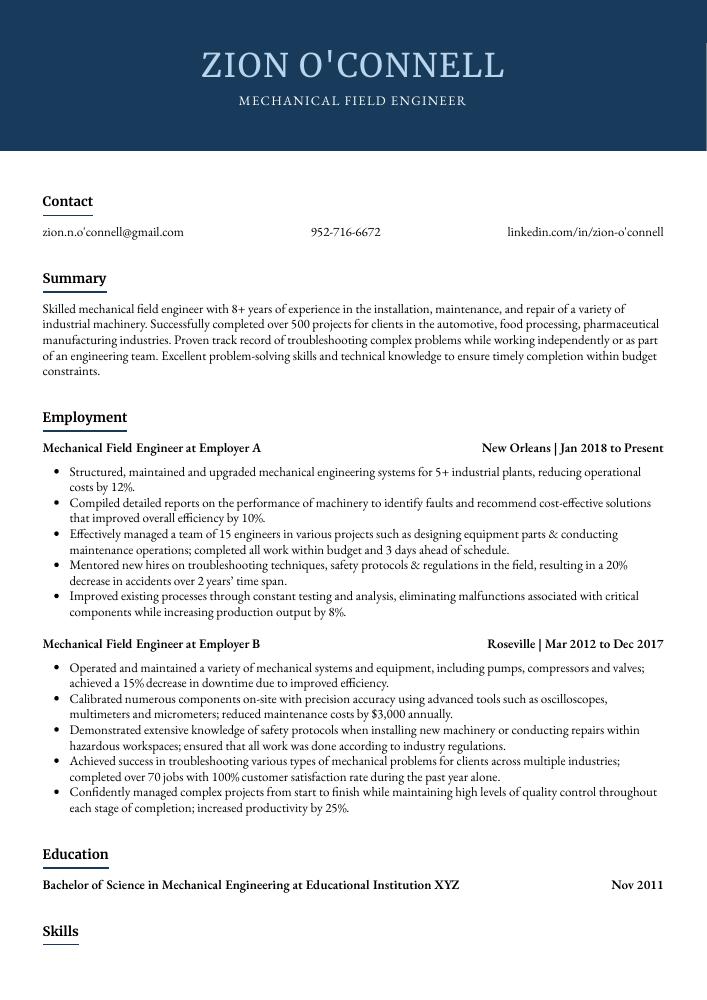Mechanical Field Engineer Resume Guide
Mechanical Field Engineers are responsible for the installation, maintenance, and repair of mechanical systems. They inspect equipment to ensure proper functioning and diagnose any malfunctions. Additionally, they develop plans for new projects and implement them by selecting materials or designing components in accordance with customer specifications.
Your mechanical engineering expertise is second to none. But potential employers don’t know what you can do—yet. To get them interested in your skills, write a resume that emphasizes your experience and qualifications.
This guide will walk you through the entire process of creating a top-notch resume. We first show you a complete example and then break down what each resume section should look like.
Table of Contents
The guide is divided into sections for your convenience. You can read it from beginning to end or use the table of contents below to jump to a specific part.
Mechanical Field Engineer Resume Sample
Zion O’Connell
Mechanical Field Engineer
zion.n.o’[email protected]
952-716-6672
linkedin.com/in/zion-o’connell
Summary
Skilled mechanical field engineer with 8+ years of experience in the installation, maintenance, and repair of a variety of industrial machinery. Successfully completed over 500 projects for clients in the automotive, food processing, pharmaceutical manufacturing industries. Proven track record of troubleshooting complex problems while working independently or as part of an engineering team. Excellent problem-solving skills and technical knowledge to ensure timely completion within budget constraints.
Experience
Mechanical Field Engineer, Employer A
New Orleans, Jan 2018 – Present
- Structured, maintained and upgraded mechanical engineering systems for 5+ industrial plants, reducing operational costs by 12%.
- Compiled detailed reports on the performance of machinery to identify faults and recommend cost-effective solutions that improved overall efficiency by 10%.
- Effectively managed a team of 15 engineers in various projects such as designing equipment parts & conducting maintenance operations; completed all work within budget and 3 days ahead of schedule.
- Mentored new hires on troubleshooting techniques, safety protocols & regulations in the field, resulting in a 20% decrease in accidents over 2 years’ time span.
- Improved existing processes through constant testing and analysis, eliminating malfunctions associated with critical components while increasing production output by 8%.
Mechanical Field Engineer, Employer B
Roseville, Mar 2012 – Dec 2017
- Operated and maintained a variety of mechanical systems and equipment, including pumps, compressors and valves; achieved a 15% decrease in downtime due to improved efficiency.
- Calibrated numerous components on-site with precision accuracy using advanced tools such as oscilloscopes, multimeters and micrometers; reduced maintenance costs by $3,000 annually.
- Demonstrated extensive knowledge of safety protocols when installing new machinery or conducting repairs within hazardous workspaces; ensured that all work was done according to industry regulations.
- Achieved success in troubleshooting various types of mechanical problems for clients across multiple industries; completed over 70 jobs with 100% customer satisfaction rate during the past year alone.
- Confidently managed complex projects from start to finish while maintaining high levels of quality control throughout each stage of completion; increased productivity by 25%.
Skills
- CAD/CAM
- Robotics
- Machining
- Welding
- Hydraulics and Pneumatics
- 3D Printing
- Troubleshooting
- Quality Control
- Fabrication
Education
Bachelor of Science in Mechanical Engineering
Educational Institution XYZ
Nov 2011
Certifications
Certified Mechanical Field Engineer
American Society of Mechanical Engineers
May 2017
1. Summary / Objective
Your resume summary is like a movie trailer – it should give the employer an overview of your skills and experience as a mechanical field engineer. Include information such as the types of machinery you have worked on, any certifications or awards you may have received, and how many years’ experience in this field you possess. You could also mention any troubleshooting techniques that helped to resolve complex technical issues during past projects.
Below are some resume summary examples:
Well-rounded mechanical field engineer with 5+ years of experience and a comprehensive knowledge in project management, problem-solving, and customer service. Expertise includes troubleshooting machinery issues onsite for both residential and commercial clients; supervised team of 3 technicians to complete projects ahead of schedule. Seeking to join ABC Tech as the next Field Engineer to drive better client satisfaction through efficient resolution of any maintenance or repair needs.
Professional mechanical field engineer with 6+ years of experience in the oil and gas, power generation, and manufacturing industries. Skilled at overseeing all aspects of implementation from concept to completion. Proven track record in resolving problems quickly and efficiently while maintaining a safe working environment. Highly experienced in troubleshooting mechanical systems for major clients across multiple sectors, including ExxonMobil and Siemens Power Generation.
Seasoned mechanical field engineer with 8+ years of experience in providing onsite technical support and maintenance to clients. Experienced at troubleshooting, diagnosing, and repairing mechanical systems across a wide range of industries including manufacturing, automotive, power generation, construction and more. Recognized for consistently delivering high quality service while exceeding customer expectations through excellent communication skills.
Diligent mechanical field engineer with 8+ years of experience in the installation and maintenance of complex mechanical systems for a wide range of clients. Possesses strong troubleshooting skills, knowledge about preventive maintenance protocols, and excellent communication abilities to ensure customer satisfaction. Looking to join ABC Co as an experienced Mechanical Field Engineer where I can utilize my expertise to provide quality services.
Detail-oriented mechanical field engineer with 5+ years of experience in the industrial and commercial sectors. Proven track record of designing high-quality machines that are cost effective, efficient, and reliable. Skilled at troubleshooting complex mechanical systems using advanced tools such as PLCs and CAD packages. Experienced in managing projects from start to finish while ensuring customer satisfaction throughout the process.
Hard-working and reliable mechanical field engineer with 5+ years of experience in various industrial settings. Expertise includes troubleshooting, repair and maintenance of complex machinery and equipment. At XYZ, completed preventative maintenance for 20 machines per day while adhering to tight deadlines and ensuring quality assurance at all times. Successfully reduced downtime by 25%.
Dependable mechanical field engineer with 6+ years of experience providing on-site technical support and maintenance for industrial machinery. Skilled in troubleshooting, inspecting equipment components, and performing preventive maintenance activities to optimize system performance. At XYZ Inc., implemented a new monitoring process that improved machine uptime by 23%.
Passionate mechanical field engineer with 5+ years of experience in the oil and gas industry. Skilled in troubleshooting, maintenance, and repair of complex equipment and systems. Seeking to join ABC Oil & Gas as a Mechanical Field Engineer to utilize expertise in advanced technologies and improve operational efficiency by 25%.
2. Experience / Employment
The employment (or experience) section is where you provide details about your work history. It should be written in reverse chronological order, meaning that the most recent job is listed first.
When writing this section, stick to bullet points as much as possible; doing so allows for easier digestion of information by the reader. You want to include detail when talking about what you did and any results achieved.
For example, instead of saying “Maintained machinery,” you could say, “Performed preventative maintenance on mechanical equipment such as pumps and compressors which resulted in a 10% increase in machine efficiency.”
To write effective bullet points, begin with a strong verb or adverb. Industry specific verbs to use are:
- Installed
- Assembled
- Calibrated
- Troubleshot
- Inspected
- Repaired
- Programmed
- Tested
- Configured
- Monitored
- Adjusted
- Fabricated
- Operated
- Analyzed
- Optimized
Other general verbs you can use are:
- Achieved
- Advised
- Assessed
- Compiled
- Coordinated
- Demonstrated
- Developed
- Expedited
- Facilitated
- Formulated
- Improved
- Introduced
- Mentored
- Participated
- Prepared
- Presented
- Reduced
- Reorganized
- Represented
- Revised
- Spearheaded
- Streamlined
- Structured
- Utilized
Below are some example bullet points:
- Successfully implemented and maintained mechanical engineering systems for over 100 projects, resulting in an overall improvement of efficiency by 15%.
- Advised clients on the selection of materials that were suitable to be used in different machinery components; identified cost-saving alternatives which resulted in a reduction of expenditure by $25,000.
- Tested complex mechanical equipment for structural integrity and performance under various conditions; successfully met all safety standards with zero incidents reported during testing.
- Participated in technical meetings with stakeholders from diverse industries such as aerospace and automotive to discuss ways to improve existing designs or develop new ones according to their requirements; completed 5 projects within 2 months ahead of schedule due diligent work ethic displayed throughout each project’s duration.
- Inspected production lines regularly for potential design flaws or operational issues while providing practical solutions based on industry best practices; decreased malfunctioning rate from 20% down to only 7%.
- Facilitated the installation and maintenance of more than 50 pieces of industrial machinery, reducing the repair time by 35% for each equipment.
- Repaired complex mechanical systems on-site to solve problems in an efficient manner; improved customer retention rate by 10%.
- Revised existing schematics and technical drawings with AutoCAD software accurately to ensure machine components could be manufactured precisely according to specifications.
- Assessed potential risks associated with new machines parts during production phase and developed preventive measures that reduced chances of accidents & safety hazards by 25%.
- Proficiently utilized diagnostic tools (e.g., multimeters) as well as hand tools (e.g., wrenches) while troubleshooting malfunctions or performing routine checkups, increasing productivity by 20%.
- Introduced new mechanical assembly processes, resulting in a 35% improvement of production time and an 8% reduction in costs.
- Accurately diagnosed problems on 10+ machines per shift; repaired broken equipment to ensure smooth workflow at all times.
- Represented the company’s interests during negotiations with suppliers for new parts and materials, leading to cost savings of $3500 annually.
- Utilized CAD software and 3D printing technologies for rapid prototyping of components and assemblies; improved design accuracy by 20%.
- Optimized existing systems through innovative troubleshooting techniques, reducing downtime from 4 hours to 1 hour on average across all machinery operations.
- Configured and maintained a fleet of 200+ machines, replacing faulty components and adjusting settings to optimize performance; achieved 5% increase in efficiency.
- Substantially reduced downtime by troubleshooting 178 mechanical issues within the last year, increasing production output by 10%.
- Troubleshot various technical problems with machinery and utilized problem-solving skills to repair or replace parts while adhering to safety regulations.
- Adjusted controls on equipment as needed for optimal functioning and calibrated instrumentation readings according to manufacturer guidelines during preventative maintenance checks every 6 months.
- Programmed complex algorithms into automated systems that monitored temperature & pressure levels, resulting in an average reduction of 15 minutes per unit produced across all lines.
- Expedited mechanical repairs on production equipment, reducing downtime by 50% and increasing project completion rate by 25%.
- Reorganized the assembly line layout to optimize production efficiency and reduce safety hazards, resulting in a 30% decrease in mechanical incidents.
- Analyzed data from machine operations to troubleshoot malfunctions, identify root cause of failures and devise solutions that improved performance by 40%.
- Independently designed improvement plans for automated systems; implemented new processes which increased productivity levels over 10 hours per week while decreasing operational costs with 15%.
- Assembled complex machinery components with minimal supervision; repaired 20+ machines per month using specialized tools such as welding torches, jacks & hoists etc., improving overall maintenance quality up to 95%.
- Reduced downtime and repair costs by 10% through the implementation of preventive maintenance procedures.
- Presented technical solutions to complex engineering problems in a clear, concise manner that was easily understood by non-technical personnel.
- Coordinated with other engineers on design projects; managed assembly of mechanical parts for 30+ machines per month and ensured quality standards were met at all times.
- Installed and tested new machinery, equipment and systems according to manufacturer’s specifications; completed installations 3 weeks ahead of schedule on average across 20 sites in two years alone.
- Reliably determined root causes of mechanical failures using critical thinking skills, manual measurements & diagnostic tools; developed strategies for continual improvement to maximize operational efficiency up to 15%.
- Spearheaded the design and installation of mechanical components on various projects, resulting in a 20% reduction in labor costs.
- Fabricated intricate parts for heavy machinery using manual and automated tools, ensuring quality control standards were maintained at all times.
- Prepared detailed reports regarding the status of ongoing engineering work and presented them to senior management team; improved performance efficiency by 10%.
- Diligently conducted preventive maintenance checks on equipment systems to identify potential problems before they occurred; reduced downtime by 25%.
- Developed prototypes for new machines that enhanced production capacity by 40%, improving overall customer satisfaction levels.
- Monitored and maintained over 200 mechanical systems and equipment, reducing downtime by 10% through successful diagnostics and repairs.
- Consistently met production goals within tight timeframes while ensuring compliance with safety regulations; conducted preventive maintenance checks on all machines to maximize efficiency of the manufacturing process without compromising quality standards.
- Streamlined processes in order to reduce costs associated with energy consumption while increasing productivity levels by 15%.
- Formulated plans for long-term projects such as designing new parts or retrofitting existing machinery components, resulting in an increase of output capacity by 20%.
3. Skills
Skill requirements will differ from employer to employer – this can easily be determined via the job advert. Organization ABC may require a mechanical field engineer to have knowledge of CAD software and Organization XYZ may need someone with experience in industrial automation.
It is essential to tailor the skills section of your resume for each job you are applying for, as many companies use applicant tracking systems that scan resumes for certain keywords before passing them on to a human.
In addition, it is recommended that you elaborate further on some of these skills by discussing them in more detail in other areas such as the summary or experience sections.
Below is a list of common skills & terms:
- 3D Printing
- CAD/CAM
- Fabrication
- Hydraulics and Pneumatics
- Machining
- Maintenance and Repair
- Quality Control
- Robotics
- Troubleshooting
- Welding
4. Education
Including an education section on your resume will depend on the level of experience you have. If you are a recent graduate with no work experience, list your education below your resume objective. However, if you have years of mechanical engineering-related work under your belt, omitting an education section might be best to focus on highlighting those experiences instead.
If including an education section is necessary for the job application process, try to mention courses and subjects related to the mechanical field engineer role that demonstrate relevant knowledge and skills.
Bachelor of Science in Mechanical Engineering
Educational Institution XYZ
Nov 2011
5. Certifications
Certifications demonstrate to a potential employer that you have the necessary skills and knowledge for a particular job. They also show that you are committed to staying up-to-date with industry trends and best practices.
Including certifications on your resume can be an effective way of showing employers that you possess the qualifications they are looking for in their ideal candidate. Make sure to list any relevant certifications, as well as when they were obtained or renewed, so hiring managers know how current your credentials are.
Certified Mechanical Field Engineer
American Society of Mechanical Engineers
May 2017
6. Contact Info
Your name should be the first thing a reader sees when viewing your resume, so ensure its positioning is prominent. Your phone number should be written in the most commonly used format in your country/city/state, and your email address should be professional.
You can also choose to include a link to your LinkedIn profile, personal website, or other online platforms relevant to your industry.
Finally, name your resume file appropriately to help hiring managers; for Zion O’Connell, this would be Zion-O’Connell-resume.pdf or Zion-O’Connell-resume.docx.
7. Cover Letter
Cover letters are an important part of the job application process. They provide a great opportunity to showcase your skills, qualifications and experience in more detail than what is included on your resume.
Usually written as 2-4 paragraphs, cover letters should be tailored for each role you apply for – this will demonstrate that you are genuinely interested in the position. It also allows recruiters to get a better sense of who you are and why you would make an excellent fit for their organisation.
Below is an example cover letter:
Dear Fred,
I am writing to apply for the mechanical field engineer position at XYZ Corporation. With over five years of experience in the engineering field, I have gained a strong understanding of mechanical systems and how to troubleshoot issues that may arise. My ability to think critically and solve problems quickly has allowed me to excel in this role, and I am confident that I can be an asset to your team.
In my current position, I am responsible for overseeing all aspects of the engineering process for a manufacturing company. This includes working with clients to develop custom solutions, designing prototypes, conducting testing, and managing production. My experience has taught me how important it is to pay close attention to detail in order to create high-quality products that meet or exceed customer expectations.
XYZ Corporation is known for its innovative approach to engineering, and I would be honored to contribute my skills and knowledge as part of your team. I believe that my experience makes me uniquely qualified for this position, and I look forward to discussing how I can add value to your organization. Thank you for your time and consideration; please do not hesitate contact me if you have any questions or would like additional information about my qualifications.
Sincerely,
Zion
Mechanical Field Engineer Resume Templates
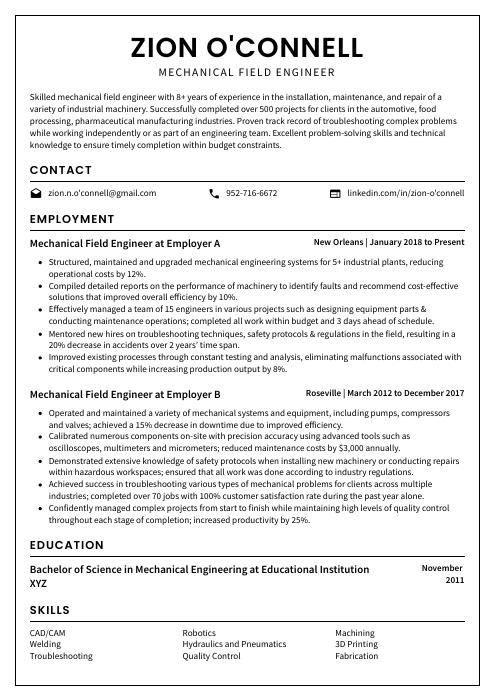 Cormorant
Cormorant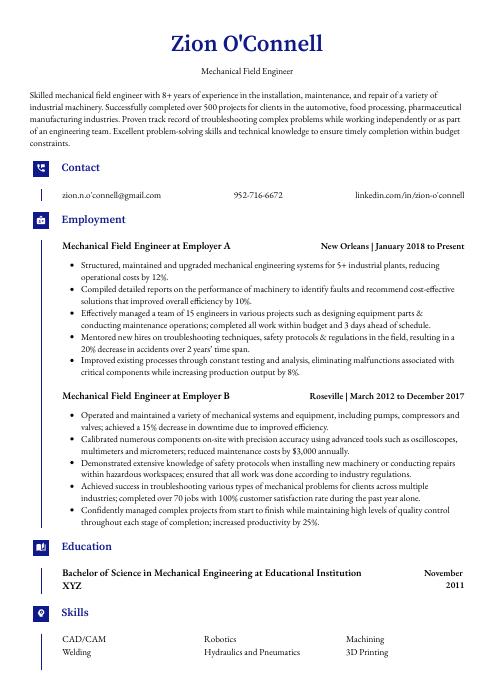 Gharial
Gharial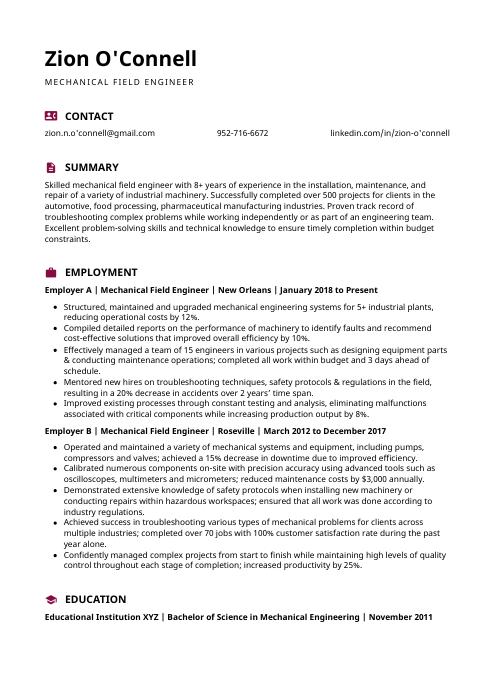 Hoopoe
Hoopoe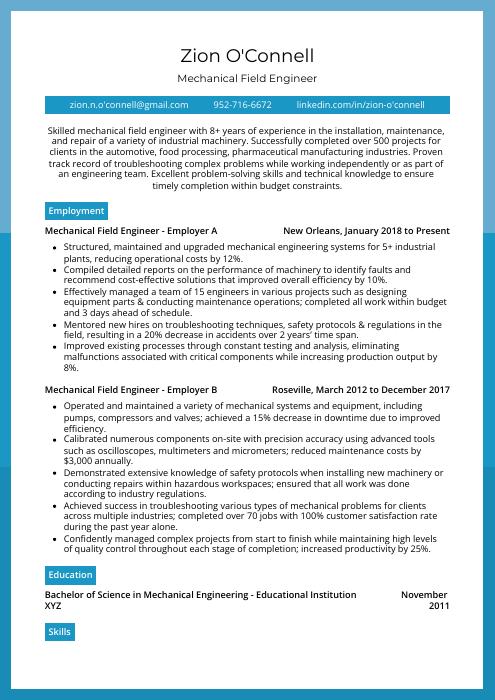 Rhea
Rhea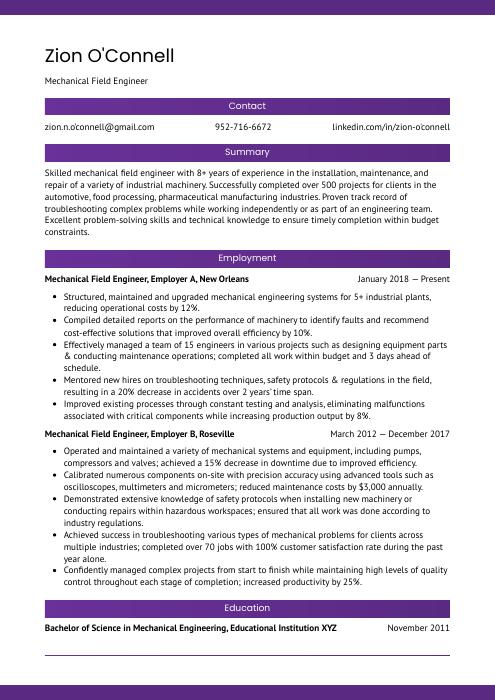 Jerboa
Jerboa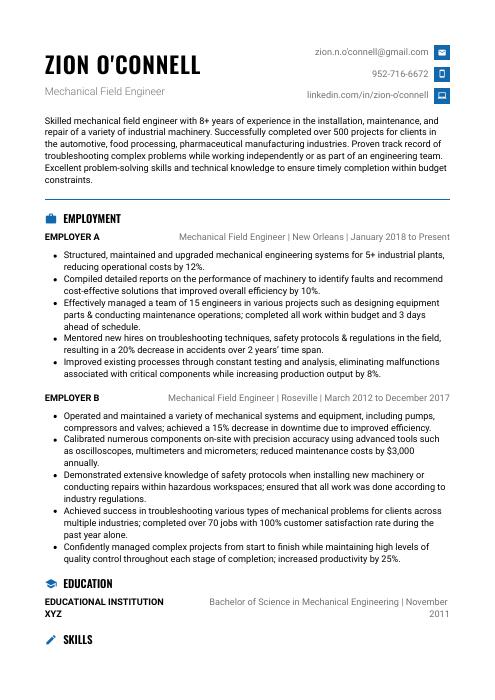 Echidna
Echidna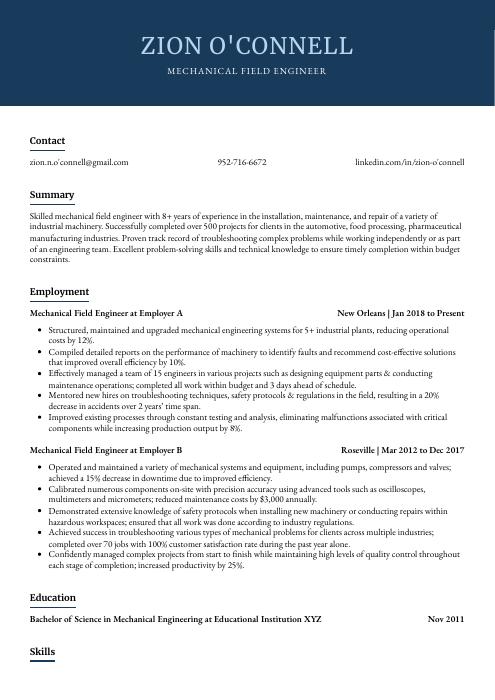 Bonobo
Bonobo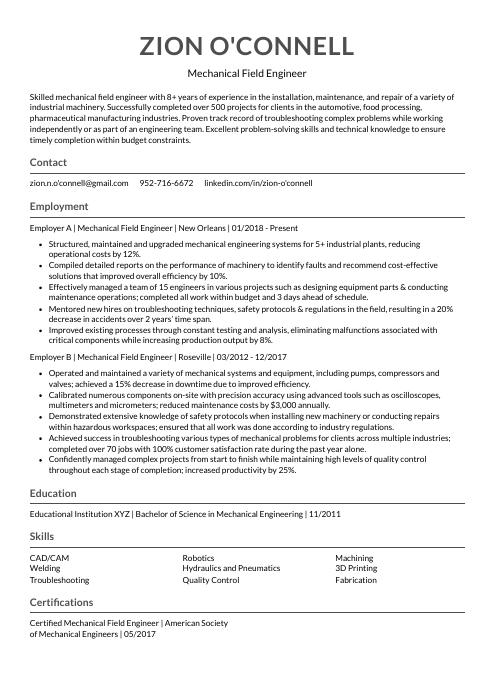 Indri
Indri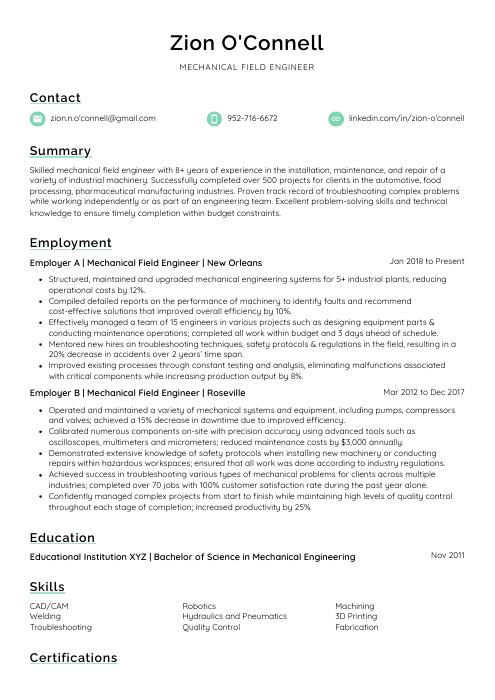 Lorikeet
Lorikeet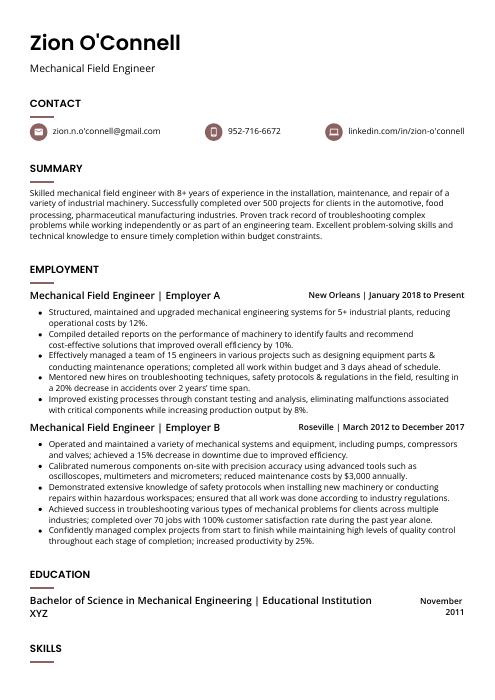 Fossa
Fossa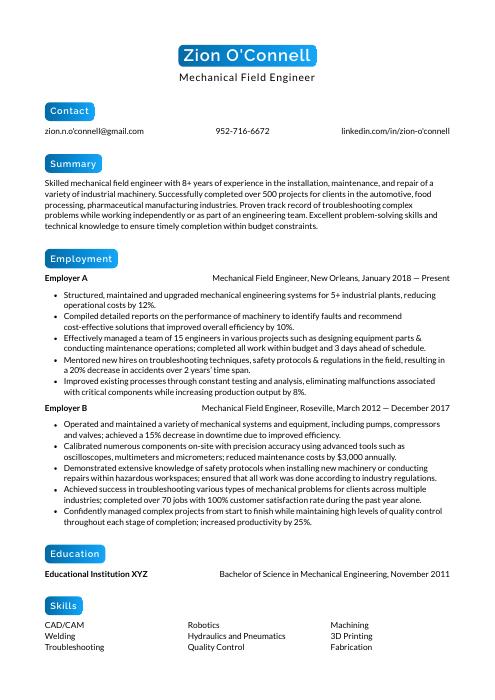 Kinkajou
Kinkajou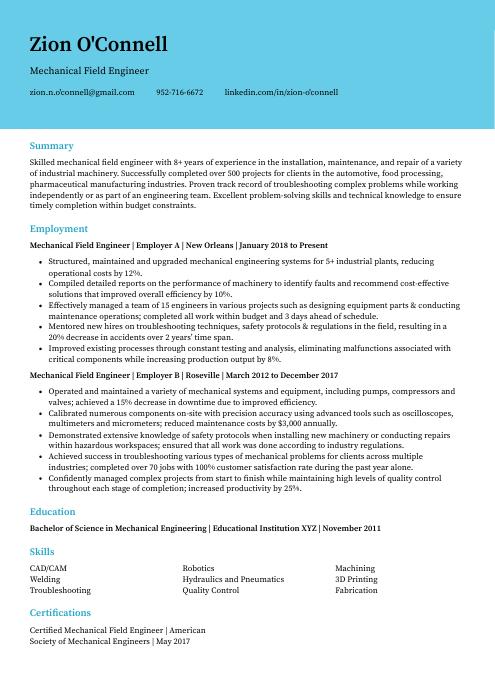 Dugong
Dugong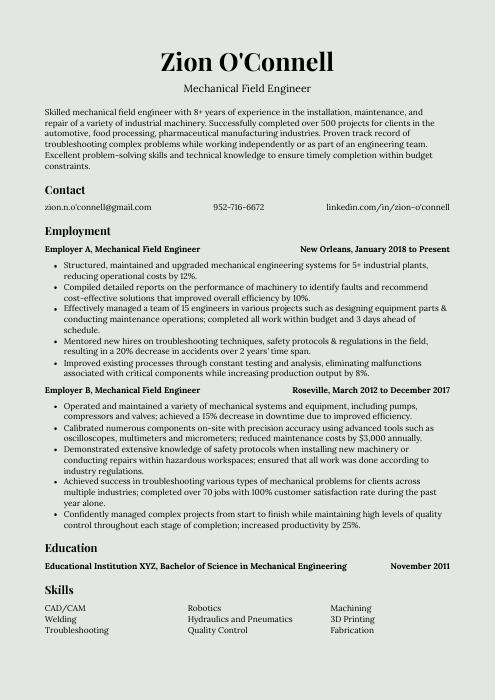 Saola
Saola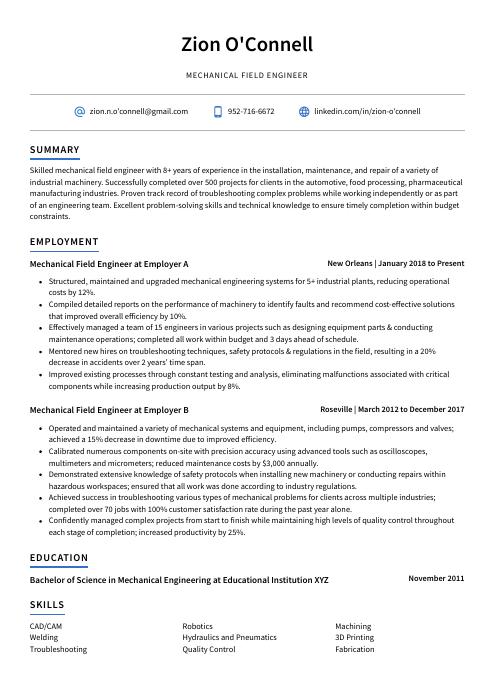 Axolotl
Axolotl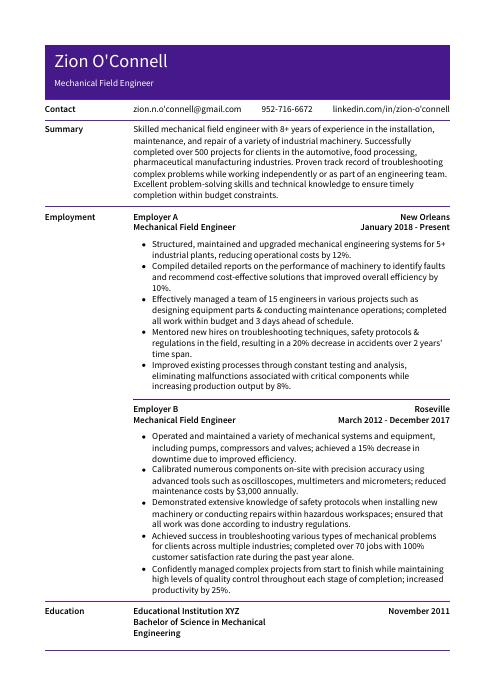 Pika
Pika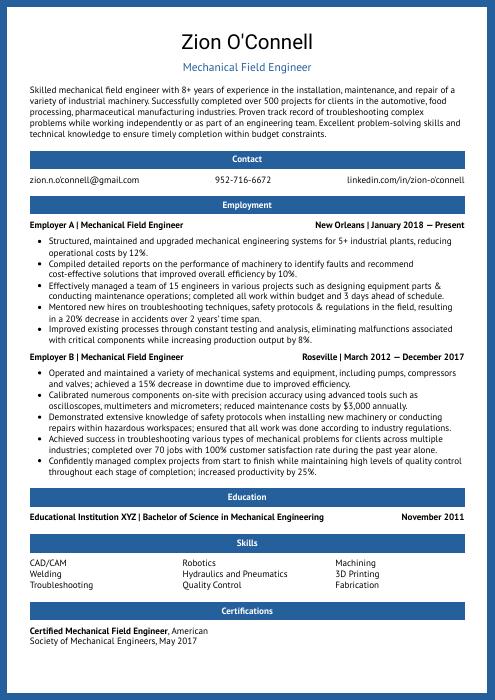 Ocelot
Ocelot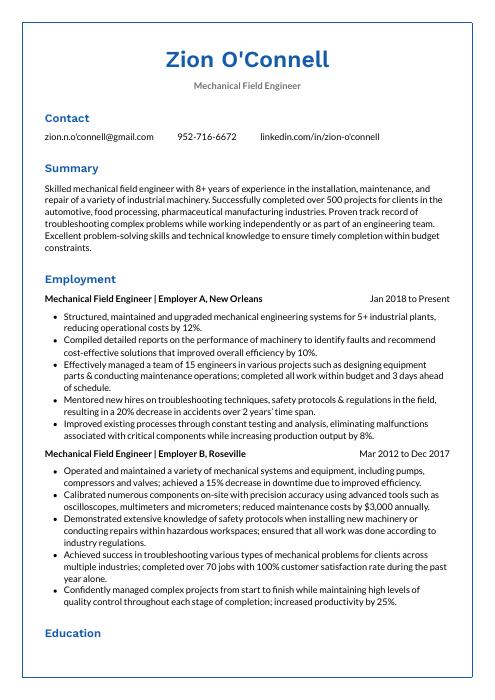 Markhor
Markhor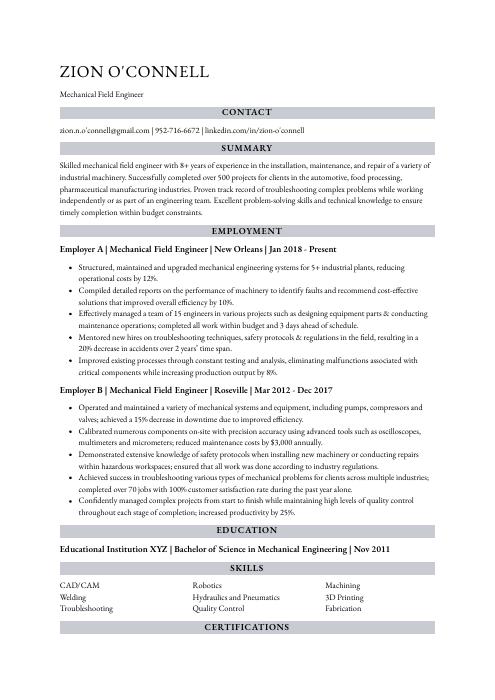 Numbat
Numbat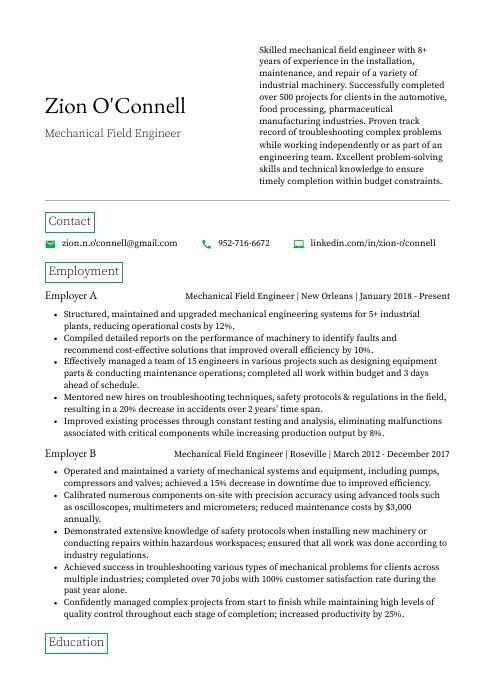 Quokka
Quokka Rezjumei
Rezjumei
